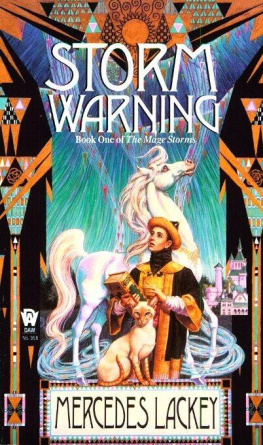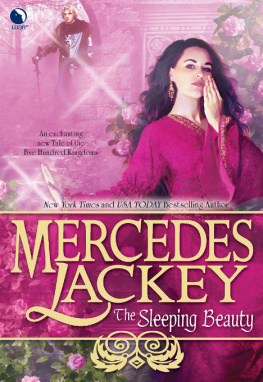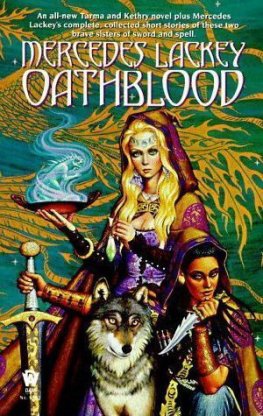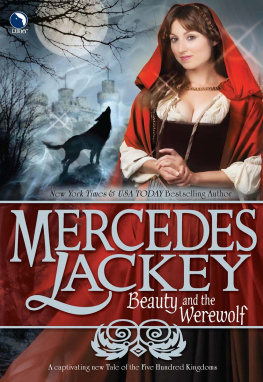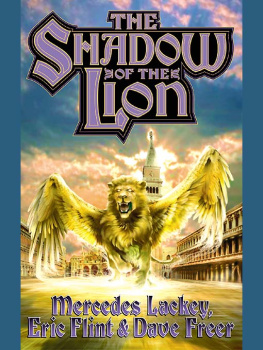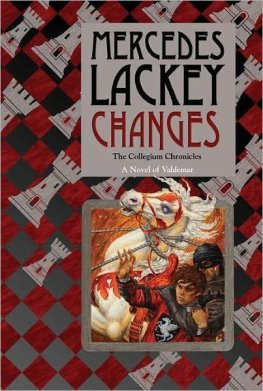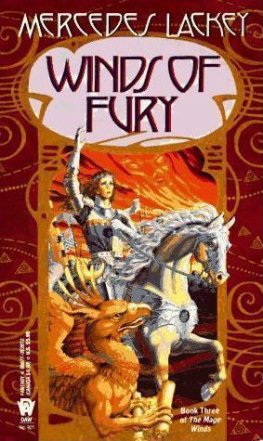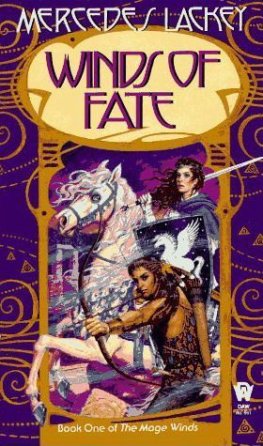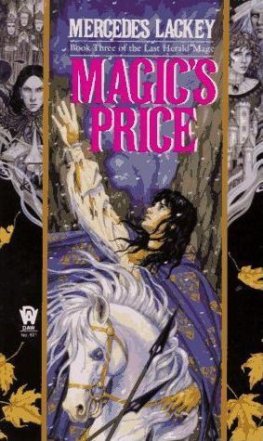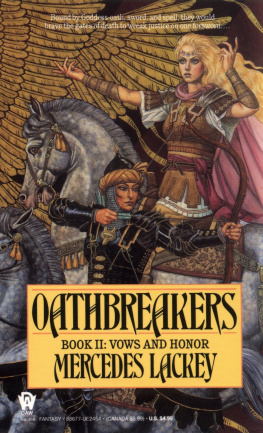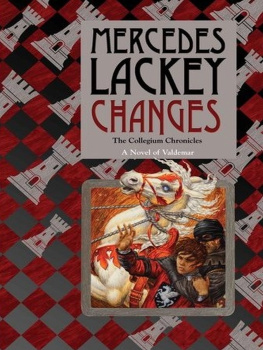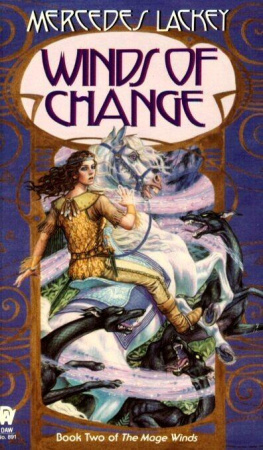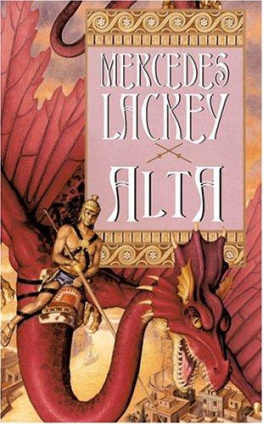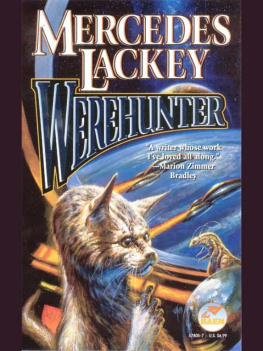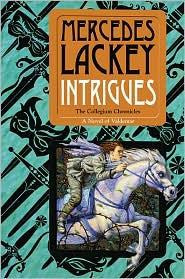Mercedes Lackey - Storm Warning
Here you can read online Mercedes Lackey - Storm Warning full text of the book (entire story) in english for free. Download pdf and epub, get meaning, cover and reviews about this ebook. genre: Detective and thriller. Description of the work, (preface) as well as reviews are available. Best literature library LitArk.com created for fans of good reading and offers a wide selection of genres:
Romance novel
Science fiction
Adventure
Detective
Science
History
Home and family
Prose
Art
Politics
Computer
Non-fiction
Religion
Business
Children
Humor
Choose a favorite category and find really read worthwhile books. Enjoy immersion in the world of imagination, feel the emotions of the characters or learn something new for yourself, make an fascinating discovery.
- Book:Storm Warning
- Author:
- Genre:
- Rating:5 / 5
- Favourites:Add to favourites
- Your mark:
- 100
- 1
- 2
- 3
- 4
- 5
Storm Warning: summary, description and annotation
We offer to read an annotation, description, summary or preface (depends on what the author of the book "Storm Warning" wrote himself). If you haven't found the necessary information about the book — write in the comments, we will try to find it.
Storm Warning — read online for free the complete book (whole text) full work
Below is the text of the book, divided by pages. System saving the place of the last page read, allows you to conveniently read the book "Storm Warning" online for free, without having to search again every time where you left off. Put a bookmark, and you can go to the page where you finished reading at any time.
Font size:
Interval:
Bookmark:
Storm Warning
Book One of the Mage Storms
by Mercedes Lackey
copyright 1994
CONTENTS
Dedicated to Elsie Wollheim
with love and respect
Emperor Charliss sat upon the Iron Throne, bowed down neither by the visible weight of his years nor the invisible weight of his power. He bore neither the heavy Wolf Crown on his head, nor the equally burdensome robes of state across his shoulders, though both lay nearby, on an ornately trimmed marble bench beside the Iron Throne. The thick silk-velvet robes flowed down the bench and coiled on the floor beside it, a lush weight of pure crimson so heavy it took two strapping young men to lift them into place on the Emperor's shoulders. The Wolf Crown lay atop the robes, preventing them from slipping off the bench altogether. Let mere kings flaunt their golden crowns; the Emperor boasted a circlet of electrum, inset with thirteen yellow diamonds. Only when one drew near enough to the Emperor to see his eyes clearly did one see that the circlet was not as it seemed, that what had passed at a distance for an abstract design or a floral pattern was, in fact, a design of twelve wolves, and that the winking yellow diamonds were their eyes. Eleven of those wolves were in profile to the watcher, five facing left, six facing right; the twelfth, obviously the pack leader, gazed directly down onto whosoever the Emperor faced, those unwinking yellow eyes staring at the petitioner even as the Emperor's own eyes did.
Let lesser beings assume thrones of gold or marble; the Emperor held court from his Iron Throne, made from the personal weapons of all those monarchs the Emperors of the past had conquered and deposed, each glazed and guarded against rust. The throne itself was over six feet tall and four feet in width; a monolithic piece of furniture, it was so heavy that it had not been moved so much as a finger-length in centuries. Anyone looking at it could only be struck by its sheer massand must begin calculating just how many sword blades, axes, and lance points must have gone into the making of it....
None of this was by chance, of course. Everything about the Emperor's regalia, his throne, his Audience Chamber, and Crag Castle itself was carefully calculated to reduce a visitor to the proper level of fearful respect, impress upon him the sheer power held in the hands of this ruler, and the utter impossibility of aspiring to such power. The Emperors were not interested in inducing a groveling fear, nor did they intend to excite ambition. The former was a dangerous state; people made too fearful would plot ways to remove the cause of that fear. And ambition was a useful tool in an underling beneath one's direct supervision, but risky in one who might, on occasion, slip his leash.
There was very little in the Emperor's life that was not the result of long thought and careful calculation. He had not become the successor to Emperor Lioth at the age of thirty without learning the value of both abilitiesand he had not spent the intervening century-and-a-half in letting either ability lapse.
Charliss was the nineteenth Emperor to sit the Iron Throne; none of his predecessors had been less than brilliant, and none had reigned for less than half a century. None had been eliminated by assassins, and only one had been unable to choose his own successor.
Some called Charliss "the Immortal"; that was a fallacy, since he was well aware how few years he had left to him. Although he was a powerful mage, there were limits to the amount of time magic could prolong one's life. Eventually the body itself became too tired to sustain life any longer; even banked fires dwindled to ash in the end. Charliss' rumored immortality was one of many myths he himself propagated. Useful rumors were difficult to come by.
The dull gray throne sat in the midst of an expanse of black-veined white marble; the Emperor's robes, the exact color of fresh-spilled blood, and the yellow gems in the crown, were the only color on the dais. Even the walls and the ceiling of the dais-alcove, a somber setting for a rich gem, were of that same marble. The effect was to concentrate the attention of the onlookers on the Emperor and only the Emperor. The battle-banners, the magnificent tapestries, the rich curtainsall these were behind and to the side of the young man who waited at the Emperor's feet. Charliss himself wore slate-gray velvets, half-robe with dagged sleeves, trews, and Court-boots, made on the same looms as the crimson robes, in his long-ago youth, his hair had been whitened by the wielding of magic and his once-dark eyes were now the same pale gray ,as an overcast dawn sky.
If the young man waiting patiently at the foot of the throne was aware of how few years the Emperor had left to him, he had (wisely) never indicated he possessed this dangerous knowledge to anyone. Grand Duke Tremane was about the same age as Charliss had been when Lioth bestowed his power and responsibility on Charliss' younger, stronger shoulders and had retired to spend the last three years of his life holding off Death with every bit of the concentration he had used holding onto his power.
In no other way were the two of them similar, however. Charliss had been one of Lioth's many, many sons by way of his state marriages; Tremane was no closer in blood to Charliss than a mere cousin, several times removed. Charliss had been, and still was, an Adept, and in his full powers before he ascended the Throne. Tremane was a mere Master, and never would have the kind of mage-power at his personal command that Charliss had.
But if mage-power or blood-ties were all that was required to take the Throne and the Crown, there were a hundred candidates to be considered before Tremane. Intelligence and cunning were not enough by themselves, either; in a land founded by stranded mercenaries, both were as common as snowflakes in midwinter. No one survived long in Charliss' court without both those qualities, and the will to use both no matter how stressful personal circumstances were.
Tremane had luck; that was important, but more than the luck itself, Tremane had the ability to recognize when his good fortune had struck, and the capability to revise whatever his current plan was in order to take advantage of that luck.
And conversely, when ill-luck struck him (which was seldom), he had the courage to revise plans to meet that as well, now and again snatching a new kind of victory from the brink of disaster.
Tremane was not the only one of the current candidates for the succession to have those qualities, but he was the one personally favored by the Emperor. Tremane was not entirely ruthless; too many of the others were. Being ruthless was not a bad thing, but being entirely ruthless was dangerous. Those who dared to stop at nothing often ended up with enemies who had nothing to lose. Putting an enemy in such a position was an error, for a man who has nothing to lose is, by definition, risking nothing to obtain what he desires.
Tremane inspired tremendous loyalty in his underlings; it had been dreadfully difficult for the Emperor's Spymaster to insinuate agents into Tremane's household. That was another useful trait for an Emperor to have; Charliss shared it, and had found that it was just as effective to have underlings willing to fling themselves in front of the assassin's blade without a single thought as it was to ferret out the assassin himself.
Otherwise, the man on the throne had little else in common with his chosen successor. Charliss had been considered handsome in his day, and the longing glances of the women in his Court even yet were not entirely due to the power and prestige that were granted to an Imperial mistress. Tremane was, to put it bluntly, so far from comely that it was likely only his power, rank, and personal prestige that won women to his bed. His thinning hair was much shorter than was fashionable, his receding hairline gave him a look of perpetual befuddlement. His eyes were too small, set just a hair too far apart; his beard was sparse, and looked like an afterthought. His thin face ended in a lantern jaw; his wiry body gave no hint of his quality as a warrior. Charliss often thought that the man's tailor ought to be taken out and hanged; he dressed Tremane in sober browns and blacks that did nothing for his complexion, and his clothing hung on him as if he had recently lost weight and muscle.
Next pageFont size:
Interval:
Bookmark:
Similar books «Storm Warning»
Look at similar books to Storm Warning. We have selected literature similar in name and meaning in the hope of providing readers with more options to find new, interesting, not yet read works.
Discussion, reviews of the book Storm Warning and just readers' own opinions. Leave your comments, write what you think about the work, its meaning or the main characters. Specify what exactly you liked and what you didn't like, and why you think so.

